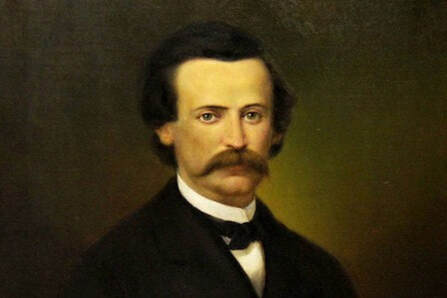Henry Timrod
 Poindexter Page Carter, Public domain, via Wikimedia Commons
Poindexter Page Carter, Public domain, via Wikimedia Commons
The Timrod Library was named for Henry Timrod, the poet who wrote the poem, “Carolina,” which lends its words to the state song of South Carolina.
Henry and his wife, Kate Godwin Timrod, had one son, William, who died months before his first birthday in 1865. A bust of Henry Timrod, erected in 1901, stands in Washington Square Park in Charleston. Like most Southerners of his era Timrod, who died in 1867 at age 38, was a supporter of the Confederacy, and some of his poems reflect his feelings and experiences during the Civil War. He was a war correspondent briefly, and later was living and working in Columbia when it was burned by Sherman’s army.
In 1899, the New York Times reported that Alfred Lord Tennyson had called Timrod “the poet laureate of the South.” The moniker persisted, and Timrod’s biographer, Henry Thompson called him “Laureate of the Confederacy.”
Though the poet had no direct connection to Summerville, the founders of the Timrod Literary and Library Society chose its name to honor this writer from their home state. The history of the Timrod Library, like most Southern institutions, was influenced by racism, the ravages of the Civil War, and segregation. For the present mission of the Timrod Library, it is all the more important to us to support inclusion, to welcome diverse authors and topics, and never to shy away from our history. Membership and programs of the Timrod Library are open to all.
Henry Timrod’s poetry often celebrated nature, as discovered by songwriter, and later Nobel Laureate, Bob Dylan. Dylan reportedly sampled from Timrod’s poetry for his 2006 album Modern Times, among other works, as reported in the New York Times, Poetry Foundation, and many other sources.
One Timrod poem that apparently inspired Dylan was “A Rhapsody of a Southern Winter Night,” written in 1860:
These happy stars, and yonder setting moon,
Have seen me speed, unreckoned and untasked,
A round of precious hours.
Oh! here, where in that summer noon I basked,
And strove, with logic frailer than the flowers,
To justify a life of sensuous rest,
A question dear as home or heaven was asked,
And without language answered. I was blest!
Henry and his wife, Kate Godwin Timrod, had one son, William, who died months before his first birthday in 1865. A bust of Henry Timrod, erected in 1901, stands in Washington Square Park in Charleston. Like most Southerners of his era Timrod, who died in 1867 at age 38, was a supporter of the Confederacy, and some of his poems reflect his feelings and experiences during the Civil War. He was a war correspondent briefly, and later was living and working in Columbia when it was burned by Sherman’s army.
In 1899, the New York Times reported that Alfred Lord Tennyson had called Timrod “the poet laureate of the South.” The moniker persisted, and Timrod’s biographer, Henry Thompson called him “Laureate of the Confederacy.”
Though the poet had no direct connection to Summerville, the founders of the Timrod Literary and Library Society chose its name to honor this writer from their home state. The history of the Timrod Library, like most Southern institutions, was influenced by racism, the ravages of the Civil War, and segregation. For the present mission of the Timrod Library, it is all the more important to us to support inclusion, to welcome diverse authors and topics, and never to shy away from our history. Membership and programs of the Timrod Library are open to all.
Henry Timrod’s poetry often celebrated nature, as discovered by songwriter, and later Nobel Laureate, Bob Dylan. Dylan reportedly sampled from Timrod’s poetry for his 2006 album Modern Times, among other works, as reported in the New York Times, Poetry Foundation, and many other sources.
One Timrod poem that apparently inspired Dylan was “A Rhapsody of a Southern Winter Night,” written in 1860:
These happy stars, and yonder setting moon,
Have seen me speed, unreckoned and untasked,
A round of precious hours.
Oh! here, where in that summer noon I basked,
And strove, with logic frailer than the flowers,
To justify a life of sensuous rest,
A question dear as home or heaven was asked,
And without language answered. I was blest!
